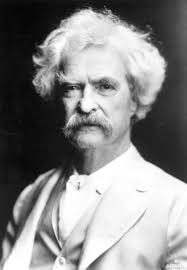 [SPOILER ALERT: if you haven’t seen the movie Miracles from Heaven and don’t know the story but want to see it, this article will spoil the ending, so you might not want to read it yet.]
[SPOILER ALERT: if you haven’t seen the movie Miracles from Heaven and don’t know the story but want to see it, this article will spoil the ending, so you might not want to read it yet.]
Some people don’t believe in miracles, because they don’t believe in a supernatural God.
However, only the first dictionary definition of “miracle” refers to divine intervention; it offers a more secular alternate definition that describes miracles merely as any extremely unusual event or accomplishment. Samuel Clemens (a.k.a. “Mark Twain”) wrote:
Truth is stranger than fiction, but it is because fiction is obliged to stick to possibilities. Truth isn’t.
And what is the truth? Quid est veritas?
As the author of three novels and three nonfiction books and articles, let me assure you that writing non-ficton is considerably easier than creating the plot of a novel from scratch.
The fictional story must appear to be plausible enough to the reader that he or she becomes willing to suspend his or her disbelief. The same isn’t the case for stories purported to be true — they simply require verifiable evidence to support any claims being made in the account.
Take the plot of the movie Miracles from Heaven, for example.
The main story simply sounds ludicrous — a young girl suffering terribly from a rare, incurable stomach disease falls thirty feet inside a rotted tree, landing Calimete on her head.
But the fall that should have killed young Anna Beam allegedly cured her. Though her neck should have been broken, and her skull smashed in pieces, not only does she survive with only minor injuries, landing on her head appears to have somehow caused her devastating, potentially fatal disease known as pseudo-obstruction motility disorder to go into remission.
Anna’s doctor suggested that the fall had somehow jump-started her immune system so that her lower intestines began to function normally…a child surviving on pain medication and feeding tubes resumed a normal life of playing soccer and eating pizza.
The medical term for Anna’s miracle cure is spontaneous remission, which simply means a diagnosed and confirmed affliction was cured due to unknown causes, without treatment or surgery.
Anna’s story sounds utterly preposterous, right? The problem is that documentation and other evidence exists. Photographs are shown during the credits of the people in real life who had been portrayed by the actors in the movie.
Anna Beam is an actual person.
Most of the facts asserted in her incredible story can be rather easily verified — for example, there are hospital and other medical records documenting her illness, the filmed news reports of her fall, etc. But not all of Anna’s story is supported by evidence and documentation.
She also claims that when she fell, she died and left her body. Anna says that Jesus told her that she must return to Earth, and that her body would be healed.
The only evidence supporting that specific claim is the fact that her body has been healed of its horrible affliction — she makes no other assertions of any corroborated veridical information learned during her alleged NDE.
So, do miracles really occur? By the second definition, absolutely. But what about the first?
The film plays up the mother’s loss of faith when Anna becomes sick. She stops going to church. Her faith is shaken. And in truth, many people must be asking themselves, why would God let a young child like Anna suffer such horrible pain, to go through such a horrible ordeal?
Is it because God wanted a great movie made about Him in Hollywood, or was the reason much more subtle? Is there even a reason at all?
The movie doesn’t explicitly say, but it seems to give us a hint. While in the hospital, Anna befriended a young girl dying from bone cancer. Her father became upset when Anna gave his daughter her necklace, a small crucifix. He subsequently found out that Anna had shared her faith with his daughter through facing her own mortality, and it upset him.
Though he was portrayed as agitated during the hospital scenes, at the end of the movie when Anna’s mother shares her testimony in church and someone in the crowd questions whether Anna had really been near death from her illness, the now grieving father of the cancer victim announces he has traveled from Massachusetts to Texas at his own expense, to corroborate her story. He claimed that Anna’s faith had given his daughter hope, and the courage to meet her imminent death.
Did Hollywood make up that last bit? How much of Anna’s story is true?
What if all of it is true?

Speak Your Mind